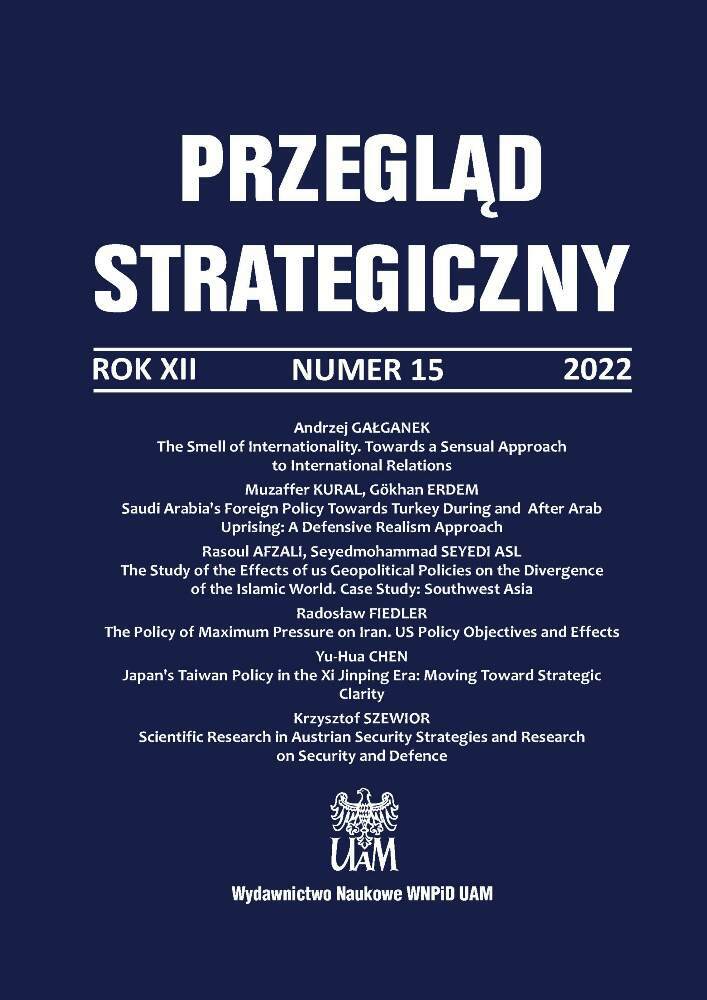Abstrakt
Wydarzenia arabskiej wiosny 2011 roku doprowadziły do redystrybucji władzy na obszarze Bliskiego Wschodu. Stworzyło to nowe wyzwania i możliwości dla mocarstw regionalnych, takich jak Arabia Saudyjska i Turcja. Turcja postrzegała arabską wiosnę jako okazję do zwiększenia swoich wpływów w regionie, tworząc tym samym poczucie zagrożenia u roszczącej sobie hegemoniczne aspiracje na Bliskim Wschodzie Arabii Saudyjskiej. Turcja, zwiększając swoje wpływy w Egipcie i Syrii zaczęła być postrzegana przez Rijad jako drugi po Iranie najważniejszy rywal w regionie. Artykuł dowodzi, że ze względu na rosnącą pozycję oraz wpływy Turcji w Egipcie i Syrii, polityka zagraniczna Arabii Saudyjskiej wobec Turcji zmienia się poprzez wspieranie lokalnych aktorów w Egipcie i Syrii w celu utrzymania status quo. Artykuł ma na celu analizę zmian w polityce zagranicznej Arabii Saudyjskiej wobec Turcji w trakcie i po wydarzeniach arabskiej wiosny na Bliskim Wschodzie w ujęciu paradygmatu realizmu defensywnego.
Bibliografia
Abueish T. (2020), Muslim Brotherhood is a terrorist group: Saudi Arabia's Council of Senior Scholars, available at: https://english.alarabiya.net/News/gulf/2020/11/11/Muslim-Brotherhood-is-a-terrorist-group-Saudi-Arabia-s-Council-of-Senior-Scholars.
Al-Awsat A. (2018), Saudi Arabia Gives $100 Million to Northeast Syria, available at: https://english.aawsat.com//home/article/1366046/saudi-arabia-gives-100-million-northeast-syria.
Almhamdi S. (2012), Saudi Arabia: No to Fundraising for Syria, available at: https://globalvoices.org/2012/06/09/saudi-arabia-no-to-fundraising-for-syria/.
Al-Rasheed M. (2010), A history of Saudi Arabia, Cambridge University Press, Cambridge. https://doi.org/10.1017/CBO9780511993510 DOI: https://doi.org/10.1017/CBO9780511993510
Altunışık M. (2019), Turkey's Relations with Egypt And Saudi Arabia: From Hopes of Cooperation to the Reality of Conflict, in: Aspiring Powers, Regional Rivals: Turkey, Egypt, Saudi Arabia, and the New Middle East, The Middle East Institute, Washington: 17-37.
Altunisik M. B. (2012), Bitter Frenemies The Not-Quite-Alliance Between Saudi Arabia And Turkey, available at: https://www.foreignaffairs.com/articles/turkey/2012-05-15/bitter-frenemies.
Anon (2012), Davutoğlu Esad'a yine ömür biçti, available at: https://www.evrensel.net/haber/35076/davutoglu-esada-yine-omur-bicti.
Anon (2019), The Saudi-Turkish antagonism, "Strategic Comments", 25(5): iv-vi, https://doi.org/10.1080/13567888.2019.1635344. DOI: https://doi.org/10.1080/13567888.2019.1635344
Baskan B. (2016), Turkey and Qatar in the Tangled Geopolitics of the Middle East, Palgrave MacMillan, London. https://doi.org/10.1057/978-1-137-51771-5 DOI: https://doi.org/10.1057/978-1-137-51771-5
Başkan B. (2019), Turkey between Qatar and Saudi Arabia: Changing Regional and Bilateral Relations, "Uluslararasi Iliskiler": 85-99.
Cafiero G. (2019), To Counter Turkey, Saudi Arabia Backs the YPG in Syria, available at: https://politicstoday.org/to-counter-turkey-saudi-arabia-backs-the-ypg-in-syria/.
Czornik K. (2020), Saudi Arabia as a Regional Power and an absolut Monarchy Undergoing Reforms. Vision 2030 - the Perspective of the end of the Second Decade of the 21st Century, "Przegląd Strategiczny", X(13): 179-198. https://doi.org/10.14746/ps.2020.1.11 DOI: https://doi.org/10.14746/ps.2020.1.11
Dalacoura K. (2013), The Arab Uprisings Two Years On: Ideology, Sectarianism and the Changing Balance of Power in the Middle East, "Insight Turkey": 75-89.
Davutoglu A. (2011), The opening of the Africa-Turkey Partnership Ministerial Review Conference, 16 December 2011, Istanbul, available at: http://www.mfa.gov.tr/the-opening-of-the-africa-turkey-partnership-ministerial-review-conference-16-december-2011.en.mfa.
Destradi S. (2010), Regional powers and their strategies: empire, hegemony, and leadership, "Review of International Studies": 903-930. https://doi.org/10.1017/S0260210510001361 DOI: https://doi.org/10.1017/S0260210510001361
Dumke D. (2019), Saudi Foreign Policy 1932-2001: Egypt, Turkey, and Regional Priorities, in: Aspiring Powers, Regional Rivals: Turkey, Egypt, Saudi Arabia, and the New Middle East, (ed.) G. T. a. D. Dumke, Middle East Institute, Washingtonpp: 56-70.
Ennis C. A., Momani B. (2013), Shaping the Middle East in the Midst of the Arab Uprisings: Turkish and Saudi foreign policy strategies, "Third World Quarterly", 34(6): 1127-1144. https://doi.org/10.1080/01436597.2013.802503 DOI: https://doi.org/10.1080/01436597.2013.802503
Gregory F., Gause I. (2011), Saudi Arabia's Regional, in: International Politics of the Persian Gulf, Syracuse University Press, New York: 169-183.
Ibish H. (2018), Saudi Arabian-Turkish rivalry in the Middle East, Middle East Policy, Washington: 9-13.
Jackson R. (2007), Regime security. Contemporary security, 5th ed., Oxford University Press, Oxford.
Jacobs J. (2012), The danger that Saudi Arabia will turn Syria into an Islamist hotbed, available at: https://www.csmonitor.com/Commentary/Opinion/2012/0412/The-danger-that-Saudi-Arabia-will-turn-Syria-into-an-Islamist-hotbed.
Jervis R. (1978), Cooperation Under the Security Dilemma, "World Politics": 167-214. https://doi.org/10.2307/2009958 DOI: https://doi.org/10.2307/2009958
Lacroix S. (2014), Saudi Islamists and the Arab Spring, LSE, London.
Lake D. A. (2009), Regional Hierarchy: Authority and Local International Order, "Review of International Studies": 35-58. https://doi.org/10.1017/CBO9781139087339.003 DOI: https://doi.org/10.1017/CBO9781139087339.003
Lobell S. E. (2017), Structural Realism/Offensive and Defensive Realism, "Oxford Research Encyclopedia of International Studies". https://doi.org/10.1093/acrefore/9780190846626.013.304 DOI: https://doi.org/10.1093/acrefore/9780190846626.013.304
McDowall A. (2012), Rise of Muslim Brotherhood frays Saudi-Egypt ties, available at: https://www.reuters.com/article/us-saudi-egypt-brotherhood/rise-of-muslim-brotherhood-frays-saudiegypt-ties-idUSBRE8400ZM20120501.
Menoret P. (2016), Crown Center for Middle East Studies, available at: https://www.brandeis.edu/crown/publications/middle-east-briefs/pdfs/101-200/meb101.pdf.
Nolte D. (2010), How to compare regional powers: analytical concepts and research topics, "Review of International Studies": 881-901. https://doi.org/10.1017/S026021051000135X DOI: https://doi.org/10.1017/S026021051000135X
Nordland R. (2013), Saudi Arabia Promises to Aid Egypt's Regime, available at: https://www.nytimes.com/2013/08/20/world/middleeast/saudi-arabia-vows-to-back-egypts-rulers.html.
Ryan C. R. (2009), Inter-Arab alliances: Regime security and Jordanian foreign policy, First ed.: University Press of Florida, Florida. https://doi.org/10.2307/j.ctv345pcpg DOI: https://doi.org/10.2307/j.ctv345pcpg
Taliaferro J. W. (2000), Security Seeking under Anarchy: Defensive Realism Revisited, "International Security": 128-161. https://doi.org/10.1162/016228800560543 DOI: https://doi.org/10.1162/016228800560543
Tang S. (2010), A Theory of Security Strategy for Our Time: Defensive Realism, Palgrave Macmillan, New York. https://doi.org/10.1057/9780230106048 DOI: https://doi.org/10.1057/9780230106048
Venetis E. (2014), The Struggle between Turkey and Saudi Arabia for the Leadership of Sunni Islam, available at: https://css.ethz.ch/en/services/digital-library/publications/publication.html/176753.
Waltz K. N. (1979), Theory of International Politics, McGraw Hill, New York.
Zarras K. (2018), Assessing the Regional Infl uence and Relationsof Turkey and Saudi Arabia After the ArabSpring, in: Turkey's Relations with the Middle East: Political Encounters after the Arab Spring, Springer International Publishing, Cham: 117-131. https://doi.org/10.1007/978-3-319-59897-0_8 DOI: https://doi.org/10.1007/978-3-319-59897-0_8
Licencja
Prawa autorskie (c) 2022 Muzaffer Kural, Gökhan Erdem

Utwór dostępny jest na licencji Creative Commons Uznanie autorstwa 4.0 Międzynarodowe.

